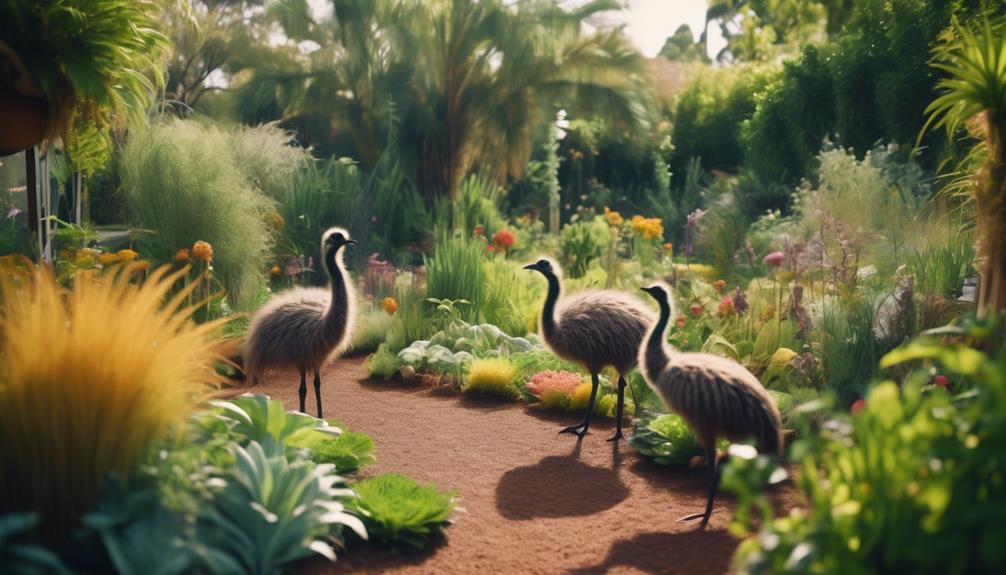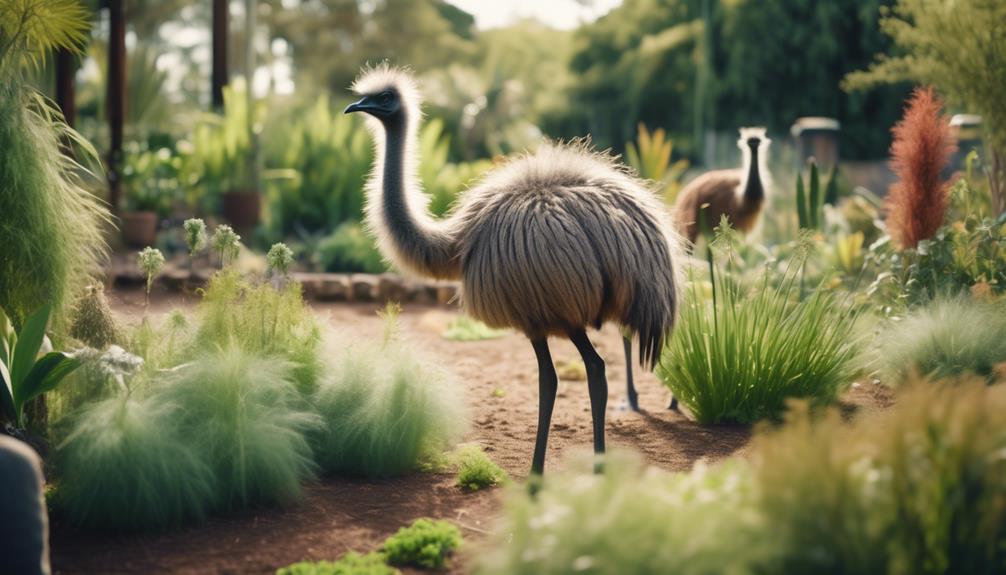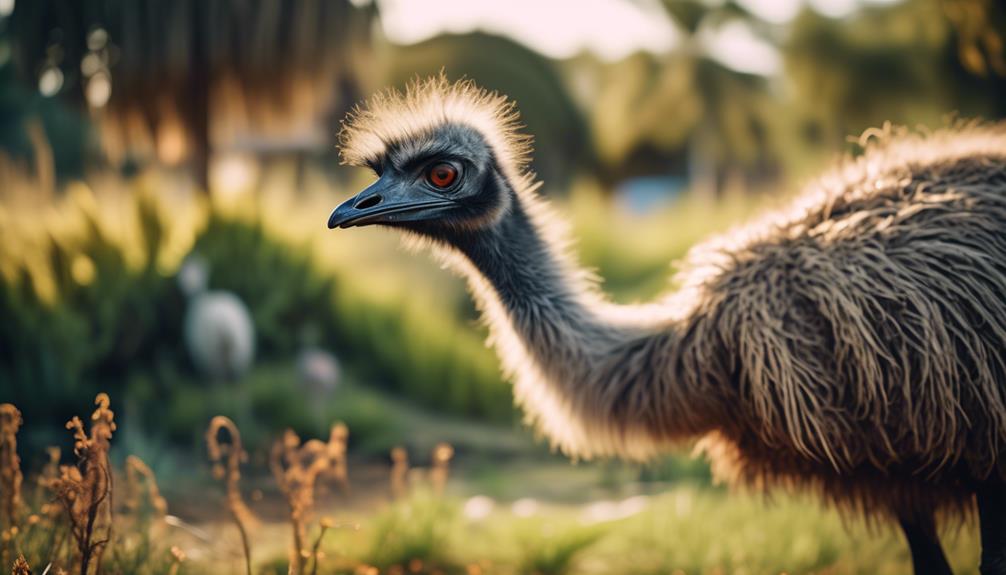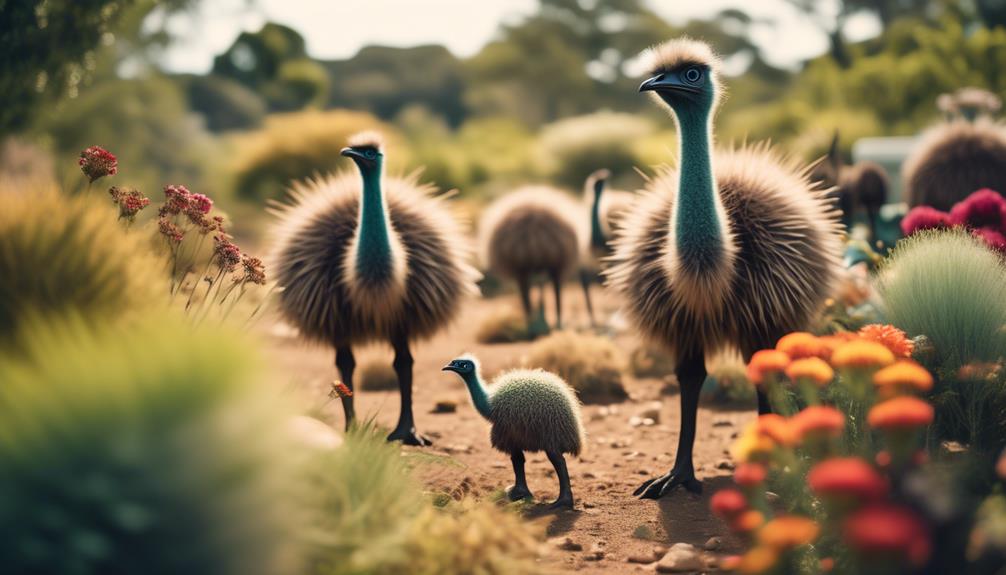
Imagine if you could have a natural and effective solution to pest control in your permaculture system. Well, that's exactly what emus can offer.
These fascinating flightless birds have been found to be highly skilled at keeping pests at bay, making them a valuable asset in permaculture design.
But their role doesn't end there. Emus also play a crucial part in efficient nutrient cycling, weed management, and even soil health improvement.
Their unique digestive system and grazing habits make them ideal partners in creating sustainable and biodiverse landscapes.
Curious to know more about how emus can revolutionize permaculture? Let's explore their diverse contributions and how you can integrate them into your own design.
Key Takeaways
- Emus serve as natural pest controllers and weed managers in permaculture systems.
- Emus contribute to nutrient cycling and soil health improvement through their consumption, waste, and activities.
- Emus act as grazing partners and habitat creators, enhancing biodiversity in permaculture gardens.
- Emus' unique digestive system and its role in sustainable land management make them valuable in permaculture designs.
Emus as Natural Pest Controllers
Emus, with their curious nature and voracious appetite for insects, offer a natural and efficient solution for controlling pests in permaculture systems. These majestic birds roam freely, pecking at the ground, and devouring pests that threaten the harmony of sustainable agriculture. Their ability to naturally control pests makes them a valuable addition to permaculture designs.
Imagine strolling through your permaculture garden, hand-in-hand with your loved ones. The sun kisses your skin as you breathe in the sweet scent of blooming flowers. As you approach your vegetable patch, you notice a group of emus gracefully moving through the rows. Their long necks reach down, delicately plucking insects from the soil. It's a harmonious dance, a symbiotic relationship between the emus and your garden.
These feathered guardians provide a holistic approach to pest control, eliminating the need for harmful chemicals or invasive methods. They maintain the delicate balance of the ecosystem, ensuring that your crops thrive without the threat of pests decimating your hard work. The emus' natural instincts and insatiable appetite for insects make them the perfect allies in your quest for sustainable agriculture.
Intimate and connected, you witness firsthand the harmony that emus bring to your permaculture system. Their presence is a testament to the power of nature's solutions, reminding you of the intricate web of life that surrounds you. Emus, the guardians of your garden, offer a natural pest control solution that's as beautiful as it's practical.
Efficient Nutrient Cycling With Emus
As you witness the emus gracefully moving through your permaculture garden, you can't help but appreciate their role in not only controlling pests but also in efficiently cycling nutrients within the ecosystem. These majestic birds have a significant impact on soil fertility, contributing to the overall health and productivity of your permaculture system.
Here are four ways in which emus enhance nutrient cycling:
- Manure Production: Emus produce nutrient-rich manure that can be used as a natural fertilizer. Their droppings are high in nitrogen, phosphorus, and potassium, essential elements for plant growth. By freely roaming and defecating throughout your garden, emus help distribute these nutrients, enriching the soil.
- Feather Decomposition: Emus shed their feathers regularly, providing a valuable source of organic matter. As the feathers decompose, they release nutrients into the soil, further enhancing its fertility.
- Digging and Aeration: Emus have strong legs and sharp claws, which they use for digging in search of food. As they forage for insects and grubs, they inadvertently loosen the soil, improving its structure and allowing better water infiltration and root growth.
- Seed Dispersal: Emus consume a variety of fruits and seeds, aiding in the dispersal of plant species throughout your permaculture garden. This natural process helps diversify plant populations and supports a more resilient ecosystem.
Emus' Role in Weed Management

To effectively manage weeds in your permaculture garden, harness the unique abilities of these elegant creatures: emus. Emus play a vital role in weed management, making them an invaluable addition to sustainable agriculture practices. These majestic birds possess a natural instinct for foraging, using their sharp beaks to pluck unwanted plants from the soil. Their large size allows them to cover large areas efficiently, making quick work of pesky weeds that threaten the health and productivity of your garden.
Emus have a selective palate, preferring certain types of plants over others. This selective browsing helps to control weed growth without damaging your desired crops. By strategically placing emus in your permaculture system, you can take advantage of their natural weed control abilities, reducing the need for manual weeding or harmful chemical interventions.
In addition to their weed management role, emus also contribute to nutrient cycling in your permaculture garden. As they consume plants, their waste serves as a rich source of organic matter that can be composted and used to fertilize the soil. This closed-loop system promotes a healthy and sustainable ecosystem, where the emus themselves become an integral part of the garden's natural processes.
Emus in permaculture offer a holistic and practical solution to weed management, aligning with the principles of sustainable agriculture. By embracing the presence of these magnificent birds, you can create a harmonious and productive garden that thrives in balance with nature.
Emus as Grazing Partners in Permaculture
Harness the natural grazing abilities of these elegant creatures to enhance the productivity and biodiversity of your permaculture garden. Emus in permaculture can serve as valuable livestock partners, contributing to the overall health and sustainability of your ecosystem.
Here are four ways emus can benefit your permaculture garden:
- Weed control: Emus have a voracious appetite for weeds, helping to naturally manage unwanted vegetation in your garden. Their grazing habits can keep invasive species at bay, reducing the need for chemical herbicides.
- Fertilization: As emus graze, they also deposit nutrient-rich manure, which acts as a natural fertilizer for your plants. This organic source of nutrients ensures healthy soil fertility and promotes robust plant growth.
- Soil aeration: Emus have powerful feet that can gently till the soil as they walk, helping to aerate compacted areas. This improves soil structure, allowing for better water infiltration and root development.
- Biodiversity enhancement: Emus can help create a more diverse ecosystem by grazing selectively. Their grazing patterns can create varied vegetation heights, providing different habitats for insects, birds, and other wildlife.
Harnessing Emus' Digestive System for Sustainable Land Management

Emus' unique digestive system offers an innovative approach to sustainable land management, unlocking the potential for improved soil health and ecosystem resilience. These fascinating creatures can play a vital role as soil builders in permaculture design, allowing you to harness their digestive abilities to enrich and rejuvenate your land.
Emus have a remarkable ability to break down tough plant matter, thanks to their large, muscular gizzards. As they consume vegetation, their gizzards grind the material into fine particles, aiding in the decomposition process. This not only improves soil structure but also increases nutrient availability for plants.
Furthermore, emus can contribute to water conservation on your property. Their efficient digestive system enables them to extract maximum moisture from the plants they consume, minimizing water requirements. This can be particularly beneficial in arid regions, where water scarcity is a significant concern.
By integrating emus into your permaculture design, you can capitalize on their natural behaviors to restore and maintain healthy soils. Their role as soil builders and water conservers can enhance the overall sustainability of your land management practices, promoting long-term ecosystem health and resilience.
Emus provide an intimate connection between land and animal, fostering a harmonious relationship with nature. Embrace the potential of these incredible creatures and witness the transformative power they hold for your permaculture journey.
Emus and Soil Health Improvement
As you explore the potential of integrating emus into your permaculture design, you'll discover their invaluable contribution to improving soil health. Emus play a crucial role in enhancing soil fertility and preventing erosion.
Here are four ways emus can help you achieve healthier soil:
- Nutrient cycling: Emus have a diverse diet that includes grasses, fruits, and insects. When they pass their droppings, these nutrient-rich pellets become a natural fertilizer, replenishing the soil with essential nutrients. This promotes healthier plant growth and increases crop yield.
- Aeration: Emus have strong legs and powerful claws, which they use to scratch and dig the ground. This activity helps to loosen compacted soil, allowing air, water, and nutrients to penetrate deeper into the soil profile. Improved soil structure enhances root development and nutrient uptake by plants.
- Weed control: Emus love to eat weeds and other unwanted vegetation. By grazing on these plants, they reduce competition for resources, allowing desirable plants to thrive. This helps to create a more balanced ecosystem and minimizes the need for chemical herbicides.
- Soil erosion prevention: Emus have long, sturdy legs that enable them to traverse rough terrains. As they move, their powerful stride helps compact the soil, making it less prone to erosion caused by wind and water. By minimizing soil erosion, emus contribute to the preservation of topsoil and the overall health of your land.
Incorporating emus into your permaculture design can be a sustainable and effective way to enhance soil health. Their unique characteristics make them valuable partners in your quest for a flourishing and resilient ecosystem.
Emus' Contribution to Biodiversity Conservation

Emus, with their unique behaviors and interactions with the environment, contribute significantly to the conservation of biodiversity in permaculture systems. These magnificent creatures play a crucial role in maintaining ecosystem balance and ensuring the survival of various plant and animal species.
One of the ways emus contribute to biodiversity conservation is through their impact on ecosystem balance. Emus are voracious herbivores, feeding on a wide variety of plants, including those that might be considered invasive or detrimental to the ecosystem. By consuming these plants, emus prevent them from spreading uncontrollably and crowding out native species. This helps maintain a diverse and balanced plant community, which in turn supports a wide range of other organisms.
Furthermore, emus play a vital role in seed dispersal. As they roam through the landscape, emus inadvertently pick up seeds on their feathers and legs. These seeds then get transported to different areas, sometimes kilometers away from their original location. This dispersal mechanism allows plants to expand their range and colonize new habitats, contributing to the overall biodiversity of the permaculture system.
Integrating Emus Into Permaculture Design: Tips and Considerations
When incorporating emus into your permaculture design, it's important to consider their specific needs and behaviors to ensure a successful integration.
Emus can play a valuable role in permaculture systems, creating a symbiotic relationship that benefits both the emus and the environment.
Here are some tips and considerations to help you integrate emus into your permaculture design:
- Provide ample space: Emus are large birds that require plenty of room to move and forage. Ensure that your permaculture design includes enough space for the emus to roam freely.
- Create suitable habitats: Emus prefer open spaces with access to grassy areas and shrubs. Design your permaculture system to include these types of habitats to attract emus and provide them with suitable nesting and foraging grounds.
- Consider fencing: Emus are curious creatures and can sometimes wander into areas where they may cause damage. Installing appropriate fencing can help keep them within designated areas and protect your crops or sensitive plants.
- Embrace their diet: Emus are omnivorous and have a varied diet. They eat grass, seeds, insects, and even small animals. Incorporate plants and insects that emus enjoy into your permaculture system to provide them with a natural food source.
Frequently Asked Questions
How Tall Can Emus Grow and How Does Their Height Impact Their Effectiveness as Natural Pest Controllers?
When it comes to emus, their growth and size play a vital role in their effectiveness as natural pest controllers. These tall birds have an advantage, using their height to spot and control pests in a holistic and practical way.
Are There Any Specific Permaculture Crops That Emus Are Particularly Effective at Protecting From Pests?
Emus as permaculture pest controllers are effective in protecting specific crops from pests. Their natural instinct to forage and their height allow them to spot and eliminate pests, ensuring the health and productivity of the crops. Emus and crop protection go hand in hand.
How Do Emus Contribute to Efficient Nutrient Cycling in Permaculture Systems?
Emus contribute to efficient nutrient cycling in permaculture systems through their behavior and diet. Their foraging habits help distribute nutrients throughout the land, while their droppings provide natural fertilizer, enriching the soil for plant growth.
Can Emus Be Trained to Specifically Target Certain Types of Weeds for Management?
Can emus be trained to specifically target certain types of weeds for management? Absolutely! By utilizing emu training techniques, you can harness their natural inclination to forage and employ them as efficient and effective weed controllers in your permaculture system.
In What Ways Do Emus Contribute to Biodiversity Conservation in Permaculture Systems?
Emus play a vital role in permaculture design by contributing to biodiversity conservation. They aid in pollination, ensuring the health and abundance of plants. Additionally, their foraging habits improve soil health, creating a sustainable ecosystem.
Conclusion
In conclusion, by integrating emus into permaculture design, you can unlock a world of possibilities for sustainable land management. These remarkable birds serve as natural pest controllers, efficient nutrient cyclers, and valuable partners in weed management and grazing.
Harnessing their digestive system can lead to improved soil health and contribute to biodiversity conservation.
So, why not embrace the emus' unique role in permaculture and let them dance their way into a harmonious and thriving ecosystem?




